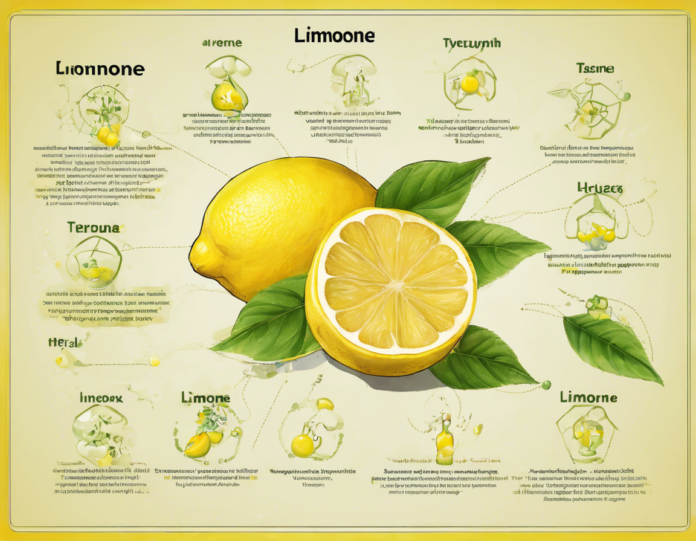When it comes to terpenes, Limonene is a standout compound well-known for its unique properties and numerous potential benefits. Limonene is a cyclic monoterpene that belongs to a class of organic compounds known for their strong aromas and potential therapeutic effects. Found in high concentrations in the zest of citrus fruits like lemons, oranges, limes, and grapefruits, Limonene is also present in various cannabis strains, along with many other plants. In this article, we will delve deep into the effects of Limonene terpene, its potential health benefits, and ways to incorporate it into your daily routine.
What is Limonene?
Limonene is a compound that is classified as a cyclic monoterpene, falling under the umbrella of terpenes, the aromatic molecules that are found in various plants. It is widely known for its citrusy aroma and is commonly used in a variety of products, including perfumes, cleaning agents, and food.
Limonene’s Potential Health Benefits
1. Anti-inflammatory Properties:
Studies suggest that Limonene may possess anti-inflammatory properties that could help reduce inflammation in the body. Inflammation is linked to various chronic conditions, and Limonene’s potential anti-inflammatory effects could be beneficial in managing such conditions.
2. Antioxidant Effects:
Limonene is believed to exhibit antioxidant properties, which can help combat oxidative stress in the body. By scavenging free radicals, Limonene may help protect cells from damage and support overall health and well-being.
3. Mood Enhancement:
The uplifting and stress-relieving properties of Limonene make it a popular choice for aromatherapy. Inhaling Limonene-rich essential oils or incorporating them into your surroundings may help uplift your mood and reduce stress levels.
4. Digestive Support:
Limonene is also thought to aid in digestive health by promoting the production of gastric juices and supporting normal peristalsis in the digestive tract. This can potentially help with issues like indigestion and bloating.
How to Incorporate Limonene into Your Routine
1. Aromatherapy:
One of the most common ways to experience the benefits of Limonene is through aromatherapy. Diffusing Limonene-rich essential oils like lemon, orange, or grapefruit in your living or work space can help elevate your mood and create a refreshing atmosphere.
2. Topical Application:
For topical use, you can dilute Limonene-rich essential oils in a carrier oil like coconut or jojoba oil and apply them to the skin. This can be beneficial for skin health and may also help with localized muscle or joint discomfort.
3. Internal Consumption:
Limonene is often used as a flavoring agent in food and beverages due to its pleasant citrusy taste. You can incorporate Limonene into your diet by adding citrus fruits like lemon or orange to your meals or enjoying a cup of hot water with a few drops of lemon essential oil.
Safety Precautions and Considerations
While Limonene is generally recognized as safe for consumption and topical use, it’s essential to consider the following safety precautions:
-
Skin Sensitivity: Some individuals may experience skin sensitivity to Limonene, especially when used in its concentrated form. It’s advisable to perform a patch test before widespread use.
-
Photo Sensitivity: Certain essential oils rich in Limonene, like citrus oils, can increase photosensitivity, making your skin more prone to sunburn. Avoid direct sunlight after applying these oils topically.
-
Purity: When using Limonene-rich essential oils, ensure they are pure and of high quality to maximize benefits and reduce the risk of potential contaminants.
Frequently Asked Questions (FAQs)
1. Can Limonene help with weight loss?
While Limonene is not a magical solution for weight loss, its potential digestion-promoting properties may support overall digestive health and contribute to a healthy metabolism.
2. Is Limonene safe for pets?
Pets can be sensitive to certain essential oils, including Limonene. It’s essential to consult with a veterinarian before using Limonene products around your pets.
3. Does Limonene interact with medications?
Limonene may interact with certain medications, especially those processed by the liver. Consult your healthcare provider before using Limonene supplements if you are on medications.
4. Can Limonene essential oils be ingested?
While some high-quality, food-grade essential oils may be safe for ingestion in minimal quantities, it’s crucial to consult a healthcare professional before ingesting any essential oils.
5. Are there any contraindications for using Limonene during pregnancy?
Pregnant women should exercise caution when using essential oils rich in Limonene. It’s recommended to consult with a qualified healthcare provider before using these products during pregnancy.
In conclusion, Limonene terpene offers a plethora of potential benefits, from its anti-inflammatory and antioxidant properties to its mood-enhancing and digestive support effects. Whether through aromatherapy, topical application, or internal consumption, incorporating Limonene into your routine may promote overall health and well-being. As with any natural remedy, it’s essential to use Limonene products mindfully, considering safety precautions and individual sensitivities to derive the maximum benefits from this versatile terpene.












